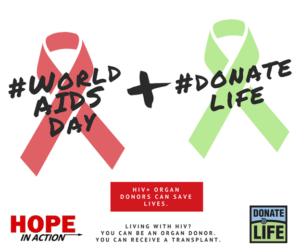 HOPE. By definition, “hope” is “an optimistic state of mind that is based on an expectation of positive outcomes with respect to events and circumstances in one’s life and the world at large.” When the HIV Organ Policy Equity (HOPE) Act was passed in 2013, this lifesaving law fulfilled this very definition for HIV-positive (HIV+) patients active on the national waitlist.
HOPE. By definition, “hope” is “an optimistic state of mind that is based on an expectation of positive outcomes with respect to events and circumstances in one’s life and the world at large.” When the HIV Organ Policy Equity (HOPE) Act was passed in 2013, this lifesaving law fulfilled this very definition for HIV-positive (HIV+) patients active on the national waitlist.
According to the United Network for Organ Sharing, the HOPE Act “called for the use of organs from HIV+ donors for transplantation into HIV+ candidates under approved research protocols designed to evaluate the feasibility, effectiveness and safety of such organ transplants.”
In honor of December being HIV/AIDS Awareness Month, Lifeline of Ohio partnered with Matt Wingler, OPO Consultant, Johns Hopkins Hope In Action Study, to provide answers to the following questions about HIV+ donation and transplantation:
Is it legal for an HIV+ individual to be a donor?
Not only is it now legal for organs from HIV+ donors to be used for transplant for HIV+ candidates in need of lifesaving transplants, but there are currently more than 200 HIV+ candidates on the waitlist who have consented to receive these transplants.
I’m surprised this patient is being evaluated for donation. Isn’t HIV an automatic exclusion?
The HIV Organ Policy Equity (HOPE) Act was passed in 2013, lifting the ban on HIV+ organ donation and transplant. Before this, no one collected any data on these HIV+ patients, who are now eligible to be donors. Research to safely use organs from HIV+ donors includes evaluating all HIV+ potential donors for transplantation.
What about the possibility of exposing someone to HIV or a harder-to-treat strain of HIV?
Extensive safety protocols are in place for hospitals, Lifeline of Ohio staff and researchers when working on HIV+ donor referrals notifications. Just like for HCV-to-HCV transplants, there are a number of protections at all levels of the system that prevent accidentally transplanting HIV+ organs into an HIV-negative recipient. While it is possible that HIV+ recipients might be exposed to a new and/or harder-to-treat strain of HIV, HOPE representatives are testing all the HIV+ donors and HIV+ recipients in a study. Based on these results, the right antiretroviral medications can be identified for each patient.
Are HIV+ patients too immunosuppressed to be good transplant candidates?
Due to advances in antiretroviral therapy, HIV is now a chronic disease rather than a death sentence. Many people living with HIV are now living just as long as uninfected individuals. With effective treatment, HIV+ patients may not even have a detectable level of virus in their blood. Several studies have shown that despite having HIV, these patients can be excellent transplant candidates and tolerate their immunosuppression regimens. Early data on outcomes of using kidneys from HIV+ donors is also very encouraging. The pioneering work of Dr. Elmi Muller in South Africa shows that HIV+ recipients of HIV+ organs had 84% survival at one year, 84% at three years and 74% at five years – comparable to outcomes with HIV-uninfected donors (NEJM 2015).
This sounds promising and exciting! How can I help?
Remember that HIV+ patients can be organ donors, too! Your timely referral notification call to Lifeline of Ohio for HIV+ potential donors could save many lives on the national transplant waiting list. When making decisions with families regarding withdrawal of care and brain death testing, please keep this in mind. Research shows that HIV+ donors can save up to a thousand lives each year, but this will only be possible with your help.
HIV/AIDS Awareness Month is an opportunity to show solidarity with the millions of people living with AIDS/HIV worldwide as well as support the importance of the HOPE Act itself. Most people do this by wearing an awareness ribbon or rocking their red! Let us know how you honor HIV+ donors and recipients by posting your photos to social media and tagging Lifeline of Ohio.
Hear from an HIV+ recipient and living kidney donor: